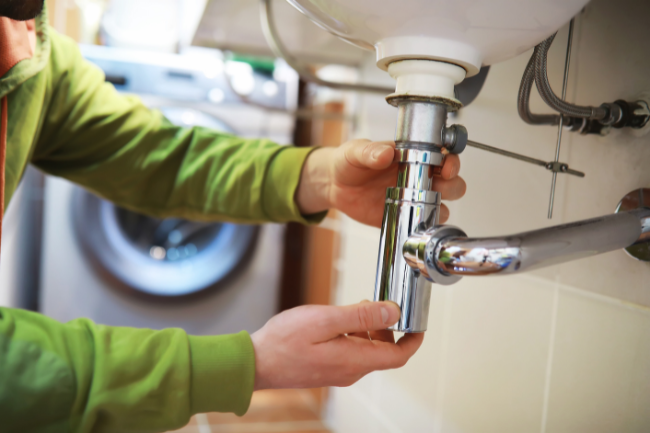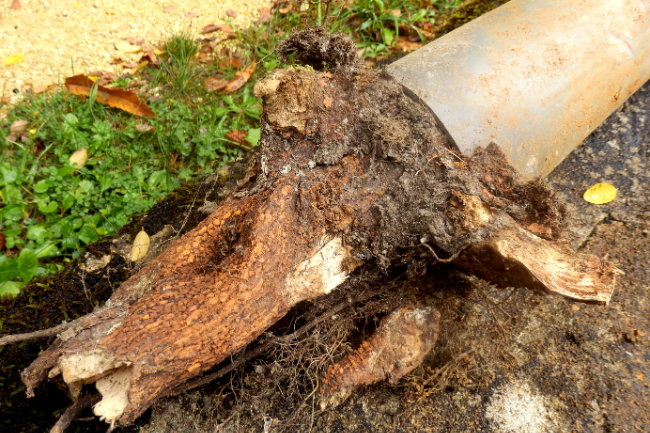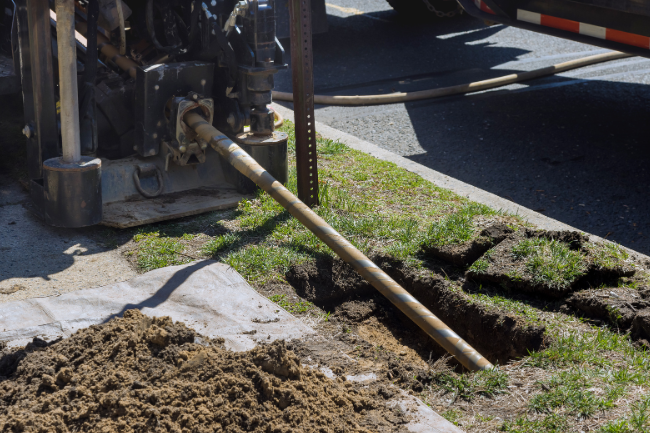5 Symptoms of a Sewer Backup + Tips to Unclog It
Posted by William Heinselman on

A clogged sewer line can quickly turn into a homeowner or business owner’s worst nightmare, causing a host of unpleasant symptoms that range from foul odors to plumbing backups. Knowing the causes of sewer backups can help you troubleshoot your property’s drain system and determine whether you can make a quick fix yourself or if you need the assistance of a professional plumber.
In this article, we will explore the common symptoms of a clogged sewer line and provide you with valuable tips and techniques to effectively unclog it.
5 Symptoms of Sewer Backups
.png?width=650&height=433&name=plumber%20in%20blue%20shirt%20(1).png)
Frequent sewer backups can be a sign of more than just a clogged pipe. If you have frequent backups, you may need a thorough inspection of your plumbing system to determine the cause. Here are some common impacts of sewer backups.
Property Damage
Sewage water’s corrosive nature can lead to extensive damage, including structural weakening, flooring destruction, and wall contamination, leading to costly repairs and replacements.
Carpets, hardwood floors, and even walls may become unsalvageable, while personal possessions and appliances can suffer irreparable harm. The potential for mold growth and secondary damage furthers the long-term consequences of sewage backups, making it crucial to take action to avoid these risks and their financial toll.
Health Hazards
Sewer backups can turn into serious health hazards due to the contaminated water they bring into your home or business. This sewage water contains a nasty cocktail of bacteria, viruses, and other harmful pathogens that can lead to infections and illnesses upon contact or even through airborne transmission.
Exposure to these contaminants can result in gastrointestinal issues, respiratory problems, skin infections, and more. To protect your health and the well-being of others, it's crucial to address sewer backups promptly, ensuring thorough cleanup and sanitation to eliminate these potential health risks.
Foul Odors
Sewer backups are notorious for unleashing foul odors that can quickly permeate your home or business. The stagnant sewage water emits a putrid, unpleasant smell that can be overwhelmingly offensive.
This odor can penetrate various areas of your property, making it uncomfortable and unsanitary. It often lingers even after the backup issue is resolved, leaving you in need of deodorization and thorough cleaning to restore a pleasant living environment.
Financial Costs
Sewer backups can lead to significant financial costs. Repairing the damage caused by sewage water, such as structural repairs, flooring replacements, and wall restoration, can be expensive.
Additionally, the cost of cleaning and sanitizing your home or business to prevent health hazards can add up. If personal belongings and appliances are damaged or destroyed, you'll need to replace them, incurring additional expenses.
Furthermore, the longer a sewer backup issue remains unresolved, the more extensive and costly the damage can become, making timely intervention crucial to minimize financial burdens.
Disruption of Daily Life
When your plumbing system is compromised, essential facilities like bathrooms and kitchens become unusable. You may find yourself unable to carry out everyday tasks like cooking, cleaning, or even using the toilet.
The inconvenience and discomfort caused by these disruptions can be frustrating, forcing you to alter your routines until the issue is resolved. Promptly addressing sewer backups is essential to minimize the inconvenience and quickly return your daily life to normal.
Common Causes of Sewer Backups

Now that we’ve identified the results of a sewer backup, let’s look at what can cause these issues.
Clogs
The most common type of sewer backup is from clogged pipes. The combination of toilet paper, hair, soap scum, and grease are common causes of sewer backups. If you have a backup that's affecting more than one toilet or sink, you could have a problem that requires a plumber. This could be a sign of an issue with your main sewer line and may indicate a problem that can't be solved with the help of a plunger or bottle of drain cleaner.
Common sewer backups can be prevented with regular maintenance and by using your drains properly. A toilet used as a trash bin will clog. Items such as cleaning wipes, diapers, napkins, and many other hygiene items should not go in the toilet.
Additionally, kitchen grease should not be poured down your sink, and garbage disposals should not be loaded with large quantities of kitchen waste. However, while proper use can prevent many common sewer pipe backups, other problems aren't as evident.
Tree Roots
Most sewer pipes lie just beneath the surface of your lawn, and as trees grow, their roots can penetrate your sewer line, clogging it and resisting any attempt by you to remedy the problem. With the use of sewer video inspection, plumbers are able to look directly into your pipes and find the problem.
Even though you may not have a tree near your sewer lines, tree roots can cross property boundaries and may be located far away from their source. If you have a sewer line that's been infiltrated, the roots will need to be cut away and the pipe repaired or replaced.
Collapsed Pipes
Many of the homes across the U.S., such as those in Sacramento, California, are over 100 years old. Common sewer pipe materials, in their original installations, are often comprised of clay, Orangeburg material, and cast iron.
As they age, these pipes are prone to crack or collapse. Trenchless technology can replace sewer pipes made from these materials with a system that causes minimal disturbance in your property.
Commercial and Municipal Sewer Backups
Commercial and municipal sewer backups pose unique challenges and risks. We’ve outlined some of the most common causes and implications of commercial and municipal sewer backups below.
Commercial Sewer Backups
Commercial buildings have different plumbing requirements than homes. For instance, restaurants and other businesses with food waste may require a grease trap. Grease traps that are not cleaned on a regular basis can result in a sewer backup in your business, and can ultimately cause you to shut your doors for good.
Commercial buildings have a high volume of traffic and the number of people using their facilities can easily cause a sewer backup. Regular maintenance by a professional plumber can head these problems off before they become an issue.
Municipal Sewer Backups
The main sewer lines that carry waste away from homes and businesses can clog and cause a backup with relative ease. When this happens, nothing you can do will fix the problem except call your local city or municipality. This is more common in homes with basements because drains lower in your home can get sewer backup from clogged municipal sewer systems.
Call a Sacramento Plumber for Frequent Sewer Backups
The team at Express Sewer & Drain specializes in diagnosing sewer line issues, from minor blockages to more complex problems like root intrusion or damaged pipes.
We use state-of-the-art equipment and technology, such as sewer cameras and trenchless repair methods, to accurately assess the condition of your sewer lines without causing extensive disruption to your property. Contact us today to learn more about our sewer repair and replacement services!
Topics: Trenchless Technology, Sewers


![Repiping Your Sacramento Home [6 Steps]](https://www.expresssewer.com/hs-fs/hubfs/plumbing%20tools%20and%20blueprints.jpeg?width=550)




